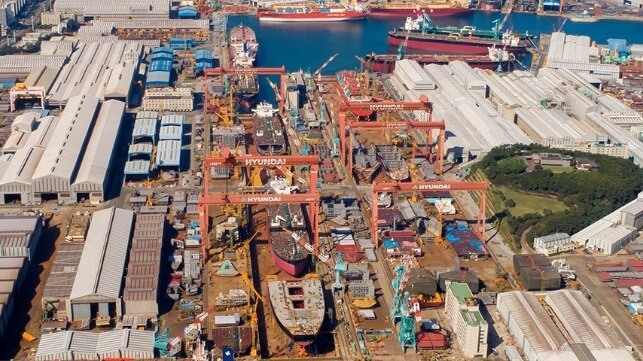Workers at HD Hyundai Voting on Strike at Three Korean Shipyards

Struggling with increasing raw material costs and labor shortages, South Korea’s shipbuilding industry is also being pressured by unionized labor for wage increases. After nearly four months of contract negotiations, the country’s largest shipbuilder, HD Hyundai’s Heavy Industry Group, is threatened with a strike while the unions are reportedly also demanding concessions in exchange for their support for the government deal to sell and recapitalize Daewoo Shipbuilding & Marine Engineering.
For the first time, union members at all three of Hyundai’s three large shipyards, Hyundai Heavy Industries as well as the Mipo and Samho sites, had decided to take a collective vote for a potential strike. Their unions began the voting on October 24 and it was scheduled to be completed Wednesday, October 26 with analysts predicting that it is likely that the workers will authorize a future strike. Union leaders have not however set a date for a strike.
Contract talks began in July two years after the last agreement between the union and Hyundai. The previous negotiations had dragged on for two years before they settled on a base pay increase which equaled approximately $16. Reports indicate that the union is asking for base pay increases this year that would equate to $99 plus as well as a 250 percent guaranteed bonus, increased dental benefits, and changes to the structure of the pay scale system.
Union officials are reporting that they have met with the company 22 times since July and are yet to receive a formal proposal. HD Hyundai rejected the union demands saying it would cost the company more than $175 million per year according to reports by Business Korea. The company applied for mediation and with talks suspended the unions have the legal right to go on strike.
In July, contract workers at Daewoo Shipbuilding & Marine Engineering ended a 51-day strike after threats that the government might move to break up the action. South Korea’s new president Yoon Suk-yeol had called the strike “unacceptable,” ordering ministers to take steps to bring it to a close. The workers had demanded as much as a 30 percent wage increase and other concessions but settled for a 4.5 percent wage increase as well as small bonuses and paid vacation time.

that matters most
Get the latest maritime news delivered to your inbox daily.
The strike further weakened the financial position of the shipyard contributing to a $1.4 billion deal with Hanwha Group that will recapitalize the shipyard group and assume management control as the Korea Development Bank reduces its investment in DSME. Business Korea is reporting that the labor unions are now demanding new agreements, including guarantees of job security and adherence to previous collective agreements, in exchange for their support of the sale of DSME.
Analysts note that the shipyards are already facing severe labor shortages in part due to the wage structure, relatively low pay, and competition from other industries. By some estimates, the worker shortage could exceed 10,000 by mid-2023. This comes as the shipyards have record orderbooks with deliveries scheduled to 2025 and beyond.
